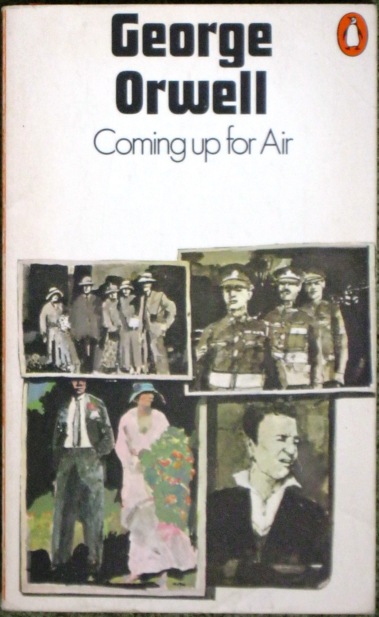As a novelist, essayist and journalist of exceptional clarity and imagination, it is unsurprising that George Orwell took a zero tolerance approach to cliché: ‘Never use a metaphor, simile or other figure of speech that you are used to seeing in print.’ He would have probably disliked my use of the over-employed ‘zero tolerance’.
Orwell’s writing embodies the war against cliché that I looked at in part 1 of this blog. His freshness and startling originality has gripped me for decades, ever since I picked up a tattered copy of 1984 for 50p in the now demolished Dave’s Books in Wakefield market. Orwell doesn’t really do cliché, I thought, as I set myself the challenge of trying to find a tired old phrase in the work of one of history’s finest exponents of prose. This morning, at random, I picked up a copy of the wonderful Coming up for Air from my bookshelves and began re-reading the opening pages for the first time in years:

The idea really came to me the day I got my new false teeth.
I remember the morning well. At about a quarter to eight I’d nipped out of bed and got into the bathroom just in time to shut the kids out. It was a beastly January morning, with a dirty yellowish-grey sky. Down below, out of the little square of bathroom window, I could see the ten yards by five of grass, with a privet hedge round it and a bare patch in the middle, that we call the back garden. There’s the same back garden, some privets, and same grass, behind every house in Ellesmere Road. Only difference — where there are no kids there’s no bare patch in the middle.
I was trying to shave with a bluntish razor-blade while the water ran into the bath. My face looked back at me out of the mirror, and underneath, in a tumbler of water on the little shelf over the washbasin, the teeth that belonged in the face. It was the temporary set that Warner, my dentist, had given me to wear while the new ones were being made. I haven’t such a bad face, really. It’s one of those bricky-red faces that go with butter-coloured hair and pale-blue eyes. I’ve never gone grey or bald, thank God, and when I’ve got my teeth in I probably don’t look my age, which is forty-five.
Making a mental note to buy razor-blades, I got into the bath and started soaping. I soaped my arms (I’ve got those kind of pudgy arms that are freckled up to the elbow) and then took the back- brush and soaped my shoulder-blades, which in the ordinary way I can’t reach. It’s a nuisance, but there are several parts of my body that I can’t reach nowadays. The truth is that I’m inclined to be a little bit on the fat side. I don’t mean that I’m like something in a sideshow at a fair. My weight isn’t much over fourteen stone, and last time I measured round my waist it was either forty-eight or forty-nine, I forget which. And I’m not what they call ‘disgustingly’ fat, I haven’t got one of those bellies that sag half-way down to the knees. It’s merely that I’m a little bit broad in the beam, with a tendency to be barrel-shaped. Do you know the active, hearty kind of fat man, the athletic bouncing type that’s nicknamed Fatty or Tubby and is always the life and soul of the party? I’m that type. ‘Fatty’ they mostly call me. Fatty Bowling. George Bowling is my real name.
Within seconds I found a bona fide cliché. I was willing to overlook ‘I remember the morning well’ as a bit of a clumsy introduction to analepsis (because it is quite tricky to use a flashback device without signalling it), I’d also given the benefit of doubt to the overused metaphor ‘making a mental note’. But I couldn’t, surely, ignore the neon glare of ‘the life and soul of the party’. This is the kind of hackneyed monstrosity that Harold Evans lists among his worst offenders. I had him. Bang to rights. In an exam, I could now proceed with a literary take down, picking up huge marks for an assassination of the opening to one of England’s finest novelists.
This, apparently, is what pupils are being asked to do in the new GCSE English Language exams. On AQA, Paper 1 Q4, pupils are asked to evaluate the quality of the writing of a celebrated (or at least famous) twentieth century writer. I’ve written before about a brave, high ability pupil whose exam I marked who attempted to critique Graham Greene’s use of the cliché ‘The clock struck eleven’ in an extract from Brighton Rock. The problem was – and this is the same problem I would encounter if I tried to slam Orwell’s ‘life and soul’- the fact that the pupil had been explicitly taught to spot clichés. They were well-read enough to know that this apparently blighted an otherwise excellent piece of fiction. The issue was that they, as a modern reader, hadn’t been able, or shown how to, place the individual cliché in context.
Brighton Rock was published in 1938, a year before Orwell’s novel. This is why caution is required before taking apart a classic: the novels are nearly 80 years old. These fatigued to the point of death expression may well have been fresh and sparkly in the 1930s. (I say ‘may well’ as I am unable, despite a lengthy search, to find datings and origins for these phrases.Besides, even if these phrases were clichéd by the 1930s… Orwell is writing in the first person. Could the use of a worn out phrase be perhaps indicative of the dull and monotonous existence of the narrator protagonist?
For these reasons, I recommend exercising restraint when teaching pupils how to spot clichés in classic fiction. By all means crack out some Dan Brown and have a bit of fun, but only to illustrate the difference between him and the greats.
Far better, I would argue, to focus on how great writers avoid or subvert clichés of expression and also clichés of the mind (plotting, characterisation etc.). Let’s apply a more positive analysis to parts of the opening of Orwell’s relatively neglected classic:
Archetypes
In fiction, the archetype is a typical, representative character. A stock character that we can recognise and identify with. Only when the archetype becomes repeated ad nauseam, without derivation or innovation, does he or she become tiresome and clichéd. In this case Bowling is the archetypal everyman, interesting to the reader because of his ordinariness. Our protagonist, with his concerns about his weight and his appearance, and the mundane Orwellian motif of ‘bluntish razor blades’ (concerns that will soon become irrelevant if our reader understands the context of the novel’s date of publication). What stops him becoming a clichéd character? I would argue his self-deprecation: ‘I don’t mean that I’m like something in a sideshow at a fair’. This simile tells us much more about the character than the ‘life and soul’ idiom.
Name
‘Fatty’ or George Bowling is a name that allows plenty of opportunity to evaluate the writing. Does it suit him? Is it effective in allowing the reader to get beneath his (flabby) skin? Yes, due to the following connotations:
- ‘Fatty’ – childlike pejorative…perhaps symbolic of his reluctance to age. Willingness as a narrator to do what Wayne Booth termed ‘disclose all’. Links to the peculiarly British trait of pointing out flaws before others can.
- ‘Bowling’ – suggestive of that other great English obsession – cricket. The verb, or gerund, implies speed or flummoxing movement, linking to the changing nature of late 1930s society.
- ‘George’ – the same name as the writer himself. Is this a signal that the novel is a roman a clef? That we should make contextual links between our hero and the writer’s own concerns and preoccupations. Orwell famously wrote: ‘it is an unusual novel that does not contain somewhere or other a portrait of the author, thinly disguised as hero, saint, or martyr.’ Of course, the irony is that George is not the writer’s real name. George Orwell is the facade behind which Eric Arthur Blair laboured…
I could go on. What I’ve started to do is apply sections of my GRANDDAD mnemonic to this piece, evaluating with an eye on cliché (be it structural and language choice) throughout. Teaching your pupils to do the same could bear fruit. Or at least produce good results.
Thanks for reading,
Mark

